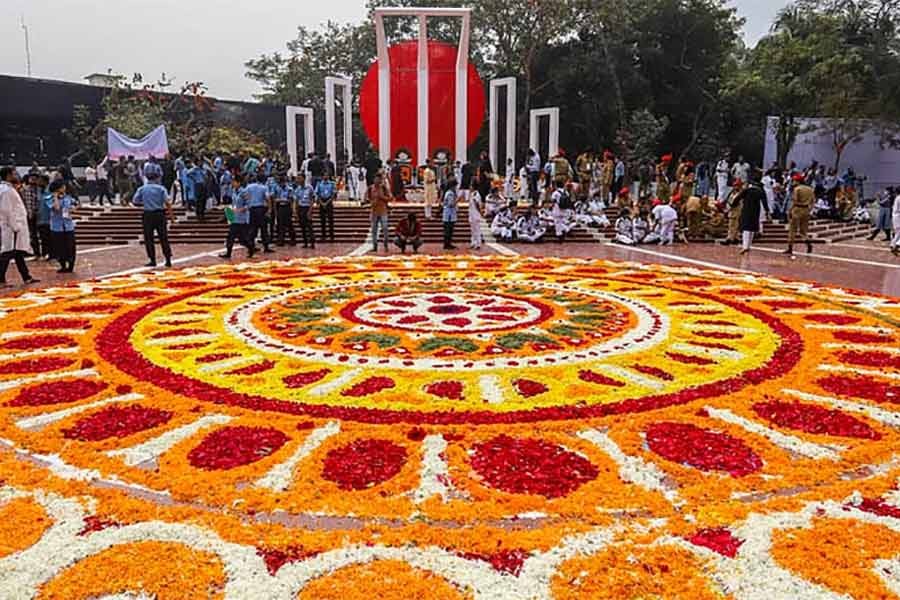The nation on Tuesday recalled the supreme sacrifice of the language heroes on this day 71 years back with a fresh call for recognising Bangla as one of the UN official languages, marking the Shaheed Dibas and International Mother Language Day.
Thousands of people clad in black and white dresses especially traditional sharees and panjabees, who thronged the Central Shaheed Minar here since midnight to pay their glowing tributes to the 1952 language martyrs, also demanded the launching of the Bangla everywhere, according to BSS.
President M Abdul Hamid and Prime Minister Sheikh Hasina paid their tributes to the martyrs of the historic Language Movement by placing wreaths at the Central Shaheed Minar in Dhaka at one minute past zero hours while the immortal song on Amar Ekushey-"Amar Bhaiyer Rakte Rangano Ekushey February"- was being played on the loudspeaker.
They stood in solemn silence for some time as a mark of profound respect to the memories of the language heroes.
Later, on behalf of Awami League, it’s President Sheikh Hasina paid homage to the language martyrs placing a wreath at the Shaheed Minar.
Then, Jatiya Sangsad (JS) Speaker Dr Shirin Sharmin Chaudhury and Deputy Speaker Fazle Rabbi Miah placed wreaths at the Central Shaheed Minar.
On behalf of Leader of the Opposition in Parliament Begum Rowshan Ershad, Jatiya Party chairman GM Quader placed a wreath at the Central Shaheed Minar.
Bangladesh Nationalist Party (BNP) also paid homage to the 1952 Language Movement martyrs marking Amar Ekushey.
Dhaka South City Mayor Sheikh Fazle Noor Taposh and chiefs of three services also placed wreaths at the Shaheed Minar.
Later, Inspector General of Police (IGP), Dhaka University (DU) Vice-Chancellor, chiefs of Rapid Action Battalion (RAB) and BGB, and foreign ambassadors to Bangladesh paid tributes to the language martyrs by placing wreaths at the Central Shaheed Minar.
Different political parties and socio-cultural organisations, Sector Commanders Forum, war-wounded freedom fighters of the Liberation War, attorney general, DU teachers' Association, Bangabandhu Sheikh Mujib Medical University, the Home Ministry and Fire service and Civil Defence also paid homage to the language martyrs.
Among the political parties and student organisations, Workers Party, JASOD, Communist Party of Bangladesh, Bangladesh Samajtantrik Dal, Samyabadi Dal, Gono Forum, Dhaka city south and north units of Awami League, Awami Jubo League, Swechchhasebak League, Mahila Awami League, Jubo Mahila League, Gonotantri Party, Bangladesh Chhatra League, Chhatra Union, Chhatra Front and Chhatra Federation paid homage to the language martyrs.
Besides, among the social, professional and cultural organisations and institutions, Bangla Academy, Dhaka Reporters' Unity (DRU), Shilpakala Academy, Bangladesh Udichi Shilpigoshthi, Kendriyo Khelaghar Asar, Bangabandhu Parishad, Bangabandhu Sangskritik Jote, Bangabandhu Gobeshona Parishad, Amra Muktijoddhar Santan, DU Senate members and Dhaka University Journalists' Association paid tributes to the language heroes.
Marking the day, the highest security measures were enforced in and around the Central Shaheed Minar and Dhaka University campus to avoid any unwanted situation. Key city points and crossings and intersections were decorated with festoons with inscriptions of Bangla letters.
Earlier, on Monday, President M Abdul Hamid and Prime Minister Sheikh Hasina issued separate messages paying rich tributes to martyrs of the Language Movement.
The day is also being observed around the world as UNESCO recognised the International Mother Language Day on November 17, 1999. Bangladeshi missions abroad are also observing the day in a befitting manner.
On the day, the national flag is kept at half-mast in all educational institutions, government, semi-government and autonomous offices and private buildings across the country.
Besides, offering Fateha, Quran Khawani, Milad Mahfil and special munajat were offered at Azimpur graveyard in the capital for the martyrs of the Language Movement while special prayers were arranged at all places of worship across the country seeking eternal peace of language martyrs.
To mark the day, Islamic Foundation (IF) organised Quran Khawani, discussion, doa and special prayers at Baitul Mukarram National Mosque here today, seeking eternal peace of the departed souls of martyrs.
In line with the national programmes, the day was also observed at all educational institutions, city corporations, pourasabhas, the district and upazila administrations and Bangladesh missions abroad.
The day was a public holiday.
Marking the day, the Central Shaheed Minar and its adjacent areas of the Dhaka University campus were decorated with street paintings and graffiti with Bangla alphabets and selected verses of eminent poets about the mother languages on the walls.
Bangladesh Betar, Bangladesh Television and private radio stations and television channels aired special programmes while national dailies published special supplements, highlighting the significance of the day.
Besides, children, students, the elderly people and the children with special needs were allowed to visit the National Museum and its affiliated branch museums and all the archeological sites and museums under the Department of Archaeology at free of cost.
On February 21 in 1952, students and people from all walks of life under the All-Party Students Action Committee took to the streets in Dhaka to protest the then Pakistan government's refusal to recognise Bangla as one of the state languages and imposition of Urdu as the only official language of Pakistan.
Salam, Barkat, Rafique, Shafique, Jabbar and some others embraced martyrdom when police opened fire on the procession in front of the Dhaka Medical College and Hospital (DMCH).
The movement for Bangla, however, did not stop and the Pakistan government on February 29, 1956 was compelled to recognise Bangla as one of the state languages of Pakistan besides Urdu.
The decision, however, could not stop the movement against repression and misrule of the then Pakistani government and subsequently led to the War of Intendance and ultimately the emergence of independent Bangladesh.


